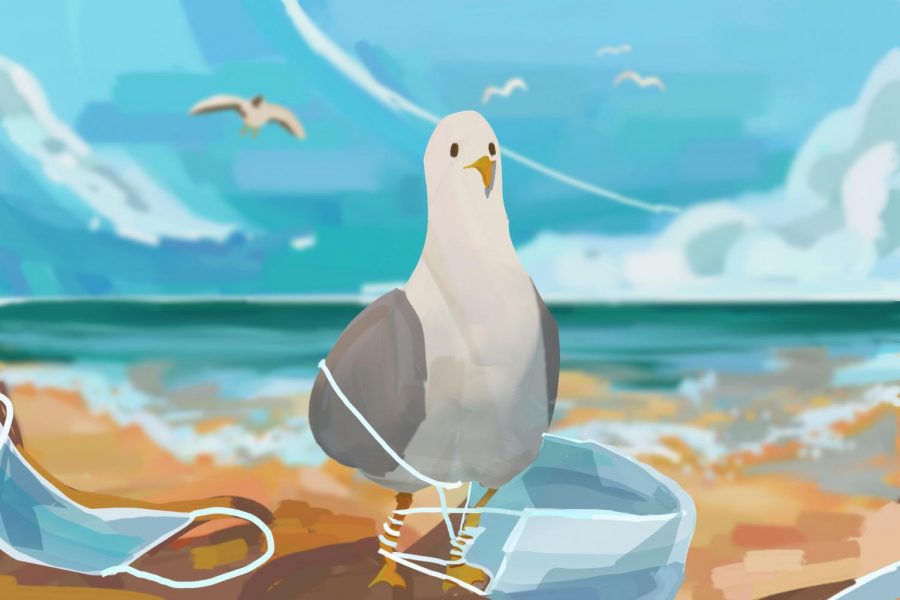Why cutting the strings off used disposable masks makes sense
Since the first outbreak of COVID-19, masks have become mandatory for both the protection of the wearer and everyone around them. The most convenient type of masks are the blue disposable ones that are found at any major store. These masks are both efficient and disposable, making it one of the most readily available items for face coverings.
Disposable masks are great for everyday use but aren’t so great for the environment and its inhabitants. Recently on social media, images of a seagull caught in the strings of a mask have been circling around. The reason being that the way masks are disposed of is improper or even littered.
According to BBC News, the seagull had been trapped by the mask for almost a week. The seagull was seen struggling to walk in Essex, UK and was called in by a local car company.
“It’s clear the mask was there for some time and the elastic straps had tightened around his legs as his joints were swollen and sore,” Adam Jones, a Royal Society for the Prevention of Cruelty to Animals (RSPCA) officer said.
Unfortunately, it is not just disposable masks that are hurting the planet, it’s every type of PPE: gloves and anything plastic used to protect people from the transmission of COVID-19. From beaches to streets, disposable masks and gloves can be spotted everywhere- littered throughout the landscapes.
“If people disposed of their masks properly, it wouldn’t be such a problem,” senior Emma Rae Gerwen said, “although I’m sure they would still end up on the Earth somehow.”
The correct way to dispose of a single-use mask is to cut off the strings and throw them away. Although they are not recyclable, they are better off in the trash than on the ground where they could get caught on or eaten by wildlife.
“If you can afford it, find somewhere to purchase a reusable one,” Gerwen said.
Disposable masks are convenient and are readily available, but they can’t be re-used as often as a poly-cotton mask or any reusable cloth mask. Consider going green and purchasing a reusable mask or even making one with a bandana or a t-shirt. It can be used multiple times and is much cheaper than continuously buying large packages of disposable masks. If not for your bank account, do it for your environment and the creatures in it: Go reusable.



Nicholas D Fouts • Sep 14, 2021 at 10:19 pm
You’re not very smart for suggesting to use them a few times…this is how and why the germs are being spread. They are disposable not for convenience or any other reason other than once they are soiled…which is almost instantly… YOU MUST DISPOSE OF THEM FREQUENTLY AND PROPERLY. Cutting the strings is nonsense. Re-using them is beyond idiotic. In fact, the way people believe these work and how they use them and reuse them is directly correlating to how diseases get spread. These are petri dishes attached to your face and are barely preventing anything. They provide little to no protection and if germs from others get on the outside of the mask it will be going straight into your mouth next. These are the biggest farce I have ever witnessed. These are placebos for your face that now because what is occurring, are now basically a petri dish spreading your own germs all over your face while collecting everyone elses. People like you who have no medical experience or idea of what you are talking about yet want to feel important by trying to tell others what to do when you are wrongly doing so is what is wrong with this society.
Sue • Apr 24, 2021 at 8:16 pm
Isn’t not littering the bigger issue? if trash is properly disposed and delivered to a landfill, why is it necessary to cut the strings?